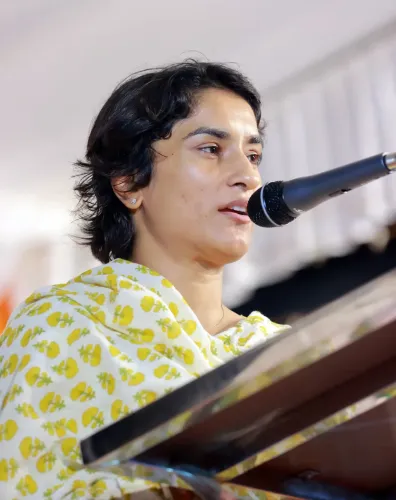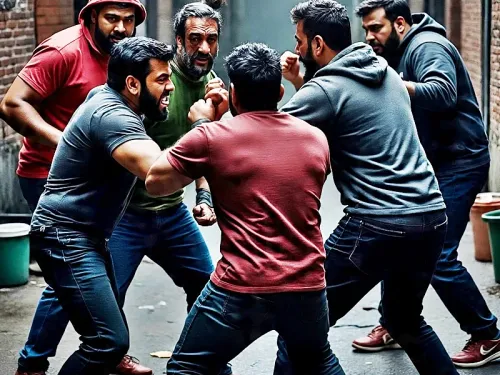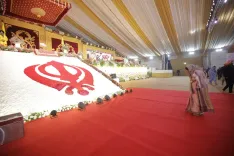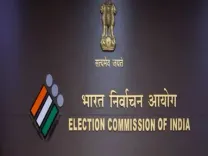What Actions Followed the Object-Throwing Incident at CJI?
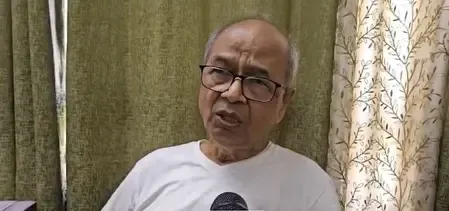
Synopsis
Key Takeaways
- Attorney General's consent is crucial for initiating contempt proceedings.
- Rakesh Kishore's actions have raised significant concerns about courtroom decorum.
- Public trust in the judiciary is essential for a functioning democracy.
- The Contempt of Courts Act, 1971 outlines the framework for handling contemptuous behavior.
- Swift action is necessary to maintain the integrity of the judicial system.
New Delhi, Oct 16 (NationPress) The Attorney General, R. Venkataramani, has given the go-ahead to commence criminal contempt proceedings against advocate Rakesh Kishore for allegedly scandalizing the Supreme Court through his behavior and statements.
Reports indicate that last week, advocate Kishore attempted to hurl an object at a bench presided over by Chief Justice of India (CJI) B.R. Gavai.
As he was being escorted out by security, he was heard shouting slogans linked to Sanatan Dharma. Initially, CJI Gavai chose not to pursue action against advocate Kishore—who reportedly approached the dais and attempted to remove his shoe—but after the Attorney General assessed the situation, he found adequate grounds to pursue contempt proceedings.
“After a thorough review of the evidence presented, I am convinced that Mr. Rakesh Kishore's actions constitute criminal contempt of the Hon’ble Supreme Court under Section 2(c) of the Contempt of Courts Act, 1971. His behavior and remarks are not only scandalous but also designed to undermine the dignity and authority of the Supreme Court,” AG Venkataramani stated in a letter to the President of the Supreme Court Bar Association (SCBA).
The Attorney General emphasized that such conduct “attacks the very core of the justice delivery system” and has a “clear potential to erode public trust in the judiciary, particularly in the highest court.”
“There is no justification for anyone to scandalize the Court. Any attempt to throw an object at the Hon’ble Judges or to vocally criticize the judges during proceedings is inherently scandalous,” AG Venkataramani said, rejecting the justifications provided by advocate Kishore for his actions.
He further pointed out the lack of contrition from the advocate, stating, “Based on the evidence, it is clear that Mr. Rakesh Kishore has displayed no remorse regarding his actions, as demonstrated by his subsequent remarks.”
According to Section 15 (1) (b) of the Contempt of Courts Act, 1971, the Supreme Court can initiate criminal contempt proceedings only with prior written consent from the Attorney General or the Solicitor General, unless the court acts suo motu.
On Thursday, SCBA President and senior advocate Vikas Singh raised the issue before Justices Surya Kant and Joymalya Bagchi, urging the apex court to urgently schedule the contempt proceedings for a hearing on Friday.
“This shoe-throwing incident cannot be overlooked. This individual shows no remorse. The criminal contempt plea must be listed for tomorrow,” Singh urged.
Solicitor General Tushar Mehta also highlighted the risks to institutional integrity and stressed the need for decisive action.
SG Mehta noted that many users on social media were glorifying the incident. In response, the Justice Surya Kant-led bench indicated that CJI Gavai had been magnanimous, suggesting that the institution had not been adversely affected by such occurrences.
“We will approach this matter without any external influence,” the apex court affirmed.
It's worth mentioning that CJI Gavai previously expressed that he and his fellow judge were “very shocked” by the incident but have since considered it “a forgotten chapter.”
“My learned colleague and I were quite taken aback by the events of Monday. For us, it remains a forgotten chapter,” CJI Gavai remarked.


